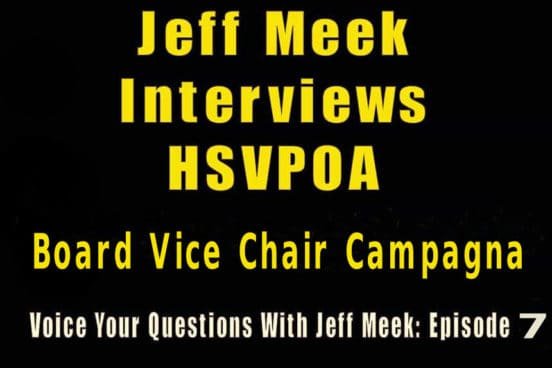Voice your questions with Jeff Meek – Episode 7 Tormey Campagna
This transcript is being provided for the hearing impaired. On July 23, 2019 Jeff Meek, Managing Editor of the Hot Springs Village Voice interviewed Tormey Campagna, HSVPOA Vice Chairman. (Link to YouTube video is below.) This is a “near” accurate transcription. While I made every effort to transcribe accurately, there have been some extraneous words such as um’s, and so on omitted, for the sake of easier reading. Much appreciation to Jeff Meek, Tormey Campagna, and the Village Voice.
Meek: Good morning. My name is Jeff Meek. I am managing editor of Hot Springs Village Voice newspaper. And this is our latest edition of, “Voice your questions with Jeff.” And my guest today is Board Vice Chairman, Tormey Campagna. Did I say it right?
Campagna: Yes, you did.
Meek: So, he’s here to answer a few questions from the public. We didn’t get many. So we’ll probably have time for me to ask a few. Thank you for taking your time to come in here.
Campagna: Thanks for your invitation. I appreciate the opportunity.
Jack Slattery
Meek: Tormey doesn’t know what he is about to be asked. So, so, here we go. All right. This is from Jack Slattery.
Slattery: Can you tell the Property Owners when the Board will keep its promise to refurbish the Balboa golf course?
Meek: And before that, he had a statement here that said:
Slattery: In the Fall, 2003, the POA Board promised to Property Owners that an approval of a four dollar increase of the assessment would go towards the refurbishment of the Balboa Golf Course, starting in the Fall of ’05. After 15 years and numerous increases in the assessments, the Board’s promise remains unfilled. Can you tell the Property Owners when the Board will keep its promise to refurbish the Balboa Golf Course?
Campagna: Well, I’ll do my best. For Jack. We have seen a proposal at this point, for the refurbishment of the golf course.
Meek: You have?
Campagna, That’s correct.
Meek: Okay
Campagna: It was presented to us in the last month or so. We expect it to budget it, budget again, in this year’s budget, which will be 2020.
Meek: Okay
Campagna: There are some, a few questions to be asked around what we should totally include in refurbishment because there are several options. I fully expect it to be budgeted and work to start and that not be pushed down the road any further than it has been. I think Jack referenced 2005. I think it was 2007. And the fact of the matter is, whichever the answer was, it was too long. And I’m convinced there are more opportunities there for us to just refurbishing it. It’s going to make the course much better to play. It’s going to make a lot of golfers happy. It’s going to make the Property Owners happy. And it may, in fact, make some of the properties, and I expect it would, more valuable around the course.
Meek: Okay, can you talk about the questions? You mentioned there are still some questions.
Campagna: Well, you can do, potentially, a total refurbishment of the course. That would be greens, fairways, tee boxes, irrigation, drainage, cart paths. That is one pure possibility. Several of us on the board would like to investigate that a little bit further to see if all of that work needs to be done because possibly, we believe it may not need to. But we’re open to discussion, to discuss it.
Meek: All right. Anything else on that?
Campagna: No, that’s pretty much where we are.
Charlie Williams
Meek: All right. From Charlie Williams. I have some questions here about the gate enhancement project.
Williams: What happened with the gate enhancement project? Where are we with that?
Campagna: Well, if he’s referencing the work that was going to be contracted with ISN, which I assume that’s what he is, well then, as you know, we are in litigation with ISN and I can’t really discuss that. We’ve filed suit against them. They’ve done a countersuit against us. I don’t know the exact date, when that’s going to be heard by the judge or go to court.
Campagna: I believe we are going to be looking at what we need to do there. But, we need to resolve the current situation with litigation before we go off and decide what the right answer is to the gates. Originally, I was, personally I thought that, I didn’t quite understand what the gate proposal from ISN was going to do, the detail. At the time, I wasn’t on the Board. But after I looked at what the end result was supposed to be, I thought it would be advantageous to the Village to have that type of system in place, but unfortunately, it’s not there.
Meek: Why do you feel that way? Why is it better, in your opinion?
Campagna: Well, I like the idea of where the Property Owners could log into a system and in fact say, “I would like Jeff to come in and get passed through the gate if he was not a member.” Right? But he was just my guest. You would then have the ability from your home computer, or potentially on your I Phone, whatever mobile device you have, to get a pass. And when you came through the gate, that pass would allow you to get through, with potentially, not having to talk to a guard, like you would today. And I thought that gave us more security because the people that would have more access to the gate or better access, would be the ones that property owners said they wanted to come in. So that made me feel more comfortable. I liked that.
Meek: Secondarily to that, what happened with the gate enhancement project, he (Williams) asks…
Williams: Who is responsible?
Meek: I guess he means who is responsible for the project. I am just guessing. But I am pretty sure, that is what he means.
Campagna: It’s not that I wouldn’t answer the question if I could. But I honestly, I don’t know who was the party that actually negotiated the contract with ISN. And I don’t know, if I have been told, I don’t remember who the project manager was on it.
Meek: And thirdly, we allow three questions per person. Charlie (Williams) asks,
Williams: What has changed with regard to future procurement activities?
Campagna: The POA has recently hired a contract officer, so hopefully we will have somebody who has experience in actual contracts, and I am not trying to say that some of the people there already didn’t have some level of experience. But having a professional individual to do the contracting, seems to make a lot of sense to me and hopefully will avoid some of the situations we’ve got in the past. There’s confusion, after the contracts been let, as to whose responsibility it is for each individual part of the contract.
Meek: So, bonding, timetables, etc., etc. would all be part of a contract officer’s look into the contract?
Campagna: I would say the answer is yes to that. And in fact, that issue came up at a recent, “Let’s Talk”, where I was one of the three people, Board Members, on the dais there. And I clearly believe that bonding makes sense. A bond gives, basically a performance bond. If you don’t live up to your end of the contract, you don’t necessarily have to litigate to get rid of (indecipherable word) to your problem. And I do not believe that very many of our contracts, if any, although I haven’t reviewed them all, have bonding in them. But I believe going forward, they should.
Meek: It’s my understanding of bonding, that you can avoid a lot of disaster situations, like the one we’re in now, i.e. litigation.
Campagna: That’s my understanding, too. And it would surely be advantageous if we could.
Meek: A contract officer? My mind is not the steel trap it once was. But, when did we get a contract officer? And who is it?
Campagana: I do not know the name of the individual, but I believe someone has been hired in the last 30 to 45 days.
Questions from Jeff Meek
Meek: So we’ll have to find out who that is. Well, that’s all the questions that were submitted by the public. But, I am sure we have some more time. I’ll ask a couple of other things that are the “buzz” out there.
Meek asks Campagna about lodge
Meek: One is a lodge, having a lodge. What is your opinion on having a lodge? And secondarily, should it be in the Village? Should it be outside the Village? What are your thoughts on that?
Campagna: I guess you could make a case for either side of the position and probably not necessarily be wrong. There is surely an advantage to have an outside lodge, because people would have access to it, just driving down Highway 5 or Highway 7, wherever it happened to be located. So that could make economical sense. And actually, for a developer, it might make a lot of economic sense.
Meek: Do you think it would be more likely to draw in a contractor if it was outside?
Campagna: Possibly, but no one’s beating down the door to do that right now, anyway. ‘Do I think a lodge inside the Village would be advantageous?’ Well, possibly. But it’s surely not a case where I want the POA to end up being the owners and running the lodge. That’s not the business we should be in. I think a lodge inside is advantageous from some perspectives of particularly golfers that want to come and play. And there could be reasonably sized groups of them. Although, we do get a lot of those people today now. But it’s not something the POA should invest in and it’s not clear to me where the right location would be. Would it be at the east? Would it be in the middle? Would it be over by Balboa golf course? I think further study needs to be done around that. But right at the moment, I am not aware of a proposal to have a lodge.
Meek asks Campagna about Comprehensive Master Plan
Meek: Another thing that just continues to be in the public discussion is the Comprehensive Master Plan. Pretty controversial from the first day we heard about it and its cost of $500,000. It looks like the CMP is not going anywhere because it seems like every meeting I am at, everything that is done at a Trails meeting or whatever meeting is supposed to be aware and cognizant of how that fits into the CMP. Lakes, you’re the liaison for the Lake’s Committee.
Campagna: I’m actually the liaison for Public Services. Dick Garrison is the liaison for Lakes.
Meek: Oh, you just filled in for him? My mistake.
Campagna: That is correct.
Meek: What is something, in your opinion, what is something that is in the CMP that can be done soon? Something that people can see the CMP is in action? So much of it seems to be, it is a very long-range plan. What are some first steps in that, that people can see that maybe there is a benefit here? Maybe it is a flop. What do you think?
Campagna: Well I think that no matter what the answer to that question is going to be, it is going to be controversial. To your point, there are a lot of people that have a lot of angst over the CMP and when I was campaigning for the position I am in, I said that the CMP needed to be completely revisited. And that wasn’t to say that there weren’t good things in it. Because I believe there are some good things in it.
Campagna: As it relates to what can be done immediately, some of the things are being done, that are in it. But they are minor, in nature. Major things that people always point to, like town centers, that’s not going to get done in a reasonable time frame. And there’s a lot of restrictions around some of the things that would like to get done because there is a restriction around the easement issues that Cooper has rights to. The CMP talks about pocket communities or pocket neighborhoods. I think that could be done in a reasonable period of time and I think there is some discussion going on around that. And you could actually make a case that the Maderas Gardens that Cooper already has in place and is now in the process of expanding, is in the form of a pocket community. I am not saying that’s the only one that is being considered because I know others are. It’s my expectation though, that is one thing we could see some action on. And that is a good thing because if it is successful and it would be designed around smaller footprint houses. There is a belief that there is a fairly good market for people for the houses in the 1,200 to 1,600 square foot area above the ones that are in the two to three to four thousand square foot area.
Campagna: It could help us a couple of ways. It could help, not only with a little bit of increase in assessments, but it could help us more importantly, not that that is not important, but in revenue for the water and sewage. It could help us even dramatically if the people play golf. Because that is the big upside for us is golfers.
Meek asks Campagna about golf
Meek: And you are a golfer?
Campagna: That is correct.
Meek: I won’t ask you what your handicap is. We won’t go there. But golf…
Campagna: Golf…
Meek: I am hearing a lot of good things about our agronomist. Talk about the golf courses in the Village. What’s the state of the golf courses? You are on them? What’s the state of the golf courses? What do you see? What do you like? What do you think is needed?
Campagna: I don’t think the golf courses have ever been in better shape, than I have seen them right now. Now as you get warmer, hotter weather, some greens start to get stressed a little. I did notice a little of that on a green or two yesterday but in on balance, the fairways are excellent. The greens are phenomenal. I’ve probably played in the last three weeks all but, maybe one of the courses. I thought everyone was excellent. The one place for work that probably is needed is around the sand traps. They tend to have some rocks in them. But because of the environment we are in with such a rocky subsoil, even when you do the right thing and put down the right mats and put sand over it, over a period of time, rocks start to come through. That’s the only thing that I see that could need a little help, but on balance, the courses are super.

Meek asks Campagna about his vote at July 17 Board meeting
Meek: I guess we need to wrap this up. If I could stick in one more question…At the last Board meeting, there was some votes taken on some current issues and how you voted, very much surprised some folks. Do you want to talk about that?
Campagna: Sure, I will talk about that. I am going to vote what I think is best for the Village. And that doesn’t mean I’ll always vote with one group that thinks one way and one group that thinks the other. On the two particular issues, there was really three votes that I voted not in favor of. But it really boiled around two particular issues.
Meek: Being? For those who don’t know.
Campagna: Well, one was the modification of a policy of what the Governance Committee could do. And I didn’t think that it… It referenced the CMP as a governing document but that didn’t make the CMP a governing document. It called it one. That’s a whole other issue. But that policy needed to be approved so that we could get the proper committees in place. Most of that policy was just wording changes. Is it a staff committee if it was a Board committee and so forth? It had no serious impact in my mind so there was no reason not to approve it. And I want to restate this for everybody listening. The Governance Committee does not set policies. The Governance Committee reviews changes to policies or bylaws to hopefully ensure that they don’t conflict with each other. Which by the way, we have some areas there where they conflict. And as Cindi did in this last meeting, we created an ad hoc committee of Property Owners that will be staff or Property Owners to address those conflicts, to get them straightened out.
Campagna: The other thing I voted… So, I thought it was the right thing to do. The other one I voted on was Article 12 and the amendment that was being made by Diana said that Article 12 should have Property Owners on every committee. Every committee today has Property Owners, with the exception of two. That is the Governance Committee and the Audit Committee.
Campagna: There could be committees in the future, not that I envision one, but there could be committees in the future that could be surrounded some of the areas that are clearly confidential, like personnel matters and stuff like that. Those kinds of committees should not have Property Owners on it. So, making a rule that every committee, carte blanche, has to have a property owner, I thought was inappropriate. Although at one point, I supported that. I thought it through and changed my mind. And all of that can be controlled by the charters. The charters can say, “Property Owners only”. It can say, “Board Members only”. So, I just thought it wasn’t the right thing to do and that’s why I voted yes. If the vote came through again, I’d probably vote the same way. I know it would upset some people. But the things that I campaigned for, that I really thought were important, I haven’t changed my mind on. And I am going to stick to that.
Meek: Well, there you have it. I appreciate you watching again this week. I hope to have another guest in a couple of weeks. I don’t have anyone confirmed yet. But we hope to see you with another edition of “Voice your question with Jeff in two weeks. Thanks.
Transcribed by Cheryl Dowden
Photography by Joe Dowden












Steve Rust
07/25/2019 — 3:04 pm
So let’s see if I understand. We can put, property owner, Tormey Campagna on the BOD and trust him with access to confidential information, but we can’t put, property owner, Tormey Campagna on a committee and trust him with access to confidential information. BTW, I believe the judge just said we have access to all books and records.
Gene Garner
07/26/2019 — 12:20 pm
I’m surprised Mr. Campagna doesn’t know who negotiated the ISN contract, Lesley’s name is on the signature block of page 8. She obviously was the project manager and negotiated the contract. And even though it was completed before his election, it is an ongoing legal matter and could cost us over $300K if we loose. I would think it deserve, at least, a passing interest.
Since Lesley is an employee of the Board, I would think all Directors would be aware of what their employees are doing, especially since they have only one.
Since we now have a “contract officer” does that mean the CEO will no longer be negotiating contracts?
I’d be interested in Mr Campagna’s opinion of the CCI complaint against the POA and the decision that was recently handed down. Also how he feels about the guidelines set up by the BOD to “vet” the property owners that want to look at our records.—Gene
Linda Anderson
07/26/2019 — 7:34 pm
What is it that the Board does not understand about the Governance Committee? Cindi Erickson had stated to all Board Members wishing to change a By-Law or Governing Document must go thru the Governance Committee. That clarified the power over the board and puts a stranglehold over a Board Member’s motion to change a By-Law.
Then, when it was discovered that the Governance Committee was no longer in compliance with the By-laws, the Governance Committee was suddenly raised from the dead, red lined and revised the By-laws ( Breaking the law with “NO AUTHORITY” ) Revisions were then presented to the Board for a vote and passed without the blink of an eye. The deed is done and future Board Members will find it very hard to change any By-Law. That’s why the passage of Article 12 was ” A Black Day In The History of Hot Springs Village “. Tormey Campagna , you could have tried to prevent this disregard for the law. Instead, you walked in lock step with the old guard to violate the By-Laws.
A great disappointment.
Also, who gave the CEO the power to place the CMP as a governing document? By being on the Governance Committee, this could be seen as power over the Board.
Kirk Denger
07/31/2019 — 12:57 am
Compagna, you are either practicing your amateur of disguises or are completely incompetent. You voted to obstruct justice by changing the bylaws that outlawed Directors from serving on committees. By making yourself complicit with the other unlawful board members is how you double-crossed your supporters and lost your exception to being unlawful. Yet you do not acknowledge the change to the bylaws vote at all, only addressing a motion to amend this non-motion. It is a non-motion because it never received a motion, only a second and then a misguided vote as amended without a motion as amended or a second. Read the transcript. A lawsuit will explain it further.